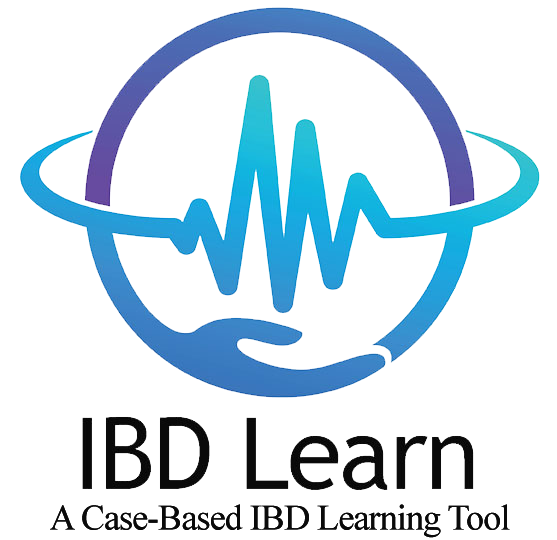Case 19 Discussion
*Please don’t forget to answer the post case question after this discussion*
Learning Objectives:
- Define intestinal failure and underlying causes.
- Review the physiology of nutrient absorption in the intestine.
- Identify treatments for diarrhea and malabsorption in patients with intestinal failure.
IBD EPAs
- EPA 4: Manage adverse events and complications of IBD and IBD therapies
- EPA 6: Manage preoperative and postoperative care for patients with IBD
- EPA 9: Evaluate and manage nutritional health status in patients with IBD
Teduglutide
Teduglutide is a Glucagon-like peptide-2 (GLP-2) agonist which is FDA approved for patients with SBS dependent on parenteral support. GLP-2 is released from the small intestine in response to oral intake. Exogenous administration results in crypt cell growth, inhibition of crypt cell apoptosis, reduced gastric acid secretion and emptying, enhanced intestinal blood flow, enhanced nutrient and fluid absorption. This drug is given by subcutaneous injection daily and can reduce dependence on parenteral support. In studies, 63% (vs 30% placebo) were able to reduce TPN volume by ≥ 20%, and patients who were able to reduce TPN volume reported significant improvement to their quality of life.
Due to the mechanism of action, teduglutide has many potential safety concerns:
- Possible acceleration of neoplastic growth and enhanced growth of colorectal polyps (6.4% developed colon polyps)
- Bowel obstruction
- Gallbladder, biliary tract and pancreatic disease
- Increased absorption of fluids leading to fluid overload in patients with cardiovascular disease (13% in studies)
- Increased absorption of oral medications with narrow therapeutic index
Prior to initiating a patient on teduglutide, perform the following assessments:
- Stop or do not start if active GI malignancy (intestine, liver, pancreas, biliary)
- Colonoscopy with removal of polyps within 6 months prior to initiation
- Non-GI malignancy: must assess risk-benefit
- Lipase, LFT within 6 months of start
- Clinical assessment of risk for cardiovascular disease and volume overload, and optimize and monitor fluid intake
- Assess for use of drugs with narrow therapeutic index, dose adjust prn
Monitoring on teduglutide should include:
- Colonoscopy at least every 5 years
- Temporarily discontinue drug if bowel obstruction noted, can re-start
- LFT and lipase Q6 month on drug
- Regular assessment and exam for volume overload or drug toxicities
Surgical Management of Intestinal Failure and Small Bowel Transplant
A full assessment of the surgical management of this condition is beyond the scope of this case curriculum, but it is important to be aware of potential surgical interventions that may improve malabsorption and quality of life (below).
- Attempt to limit initial resection
- Spare as much ileum, colon, IC valve as possible with initial resection
- Attempt to keep or restore colon continuity with small bowel
- Assess for and remove or repair strictures and fistulas when present
- Bowel lengthening surgical techniques are available; more likely to be helpful in children
- Intestinal transplant as a last resort
Intestinal transplant indications include:
- More than 1/2 of vascular access sites used for TPN are thrombosed
- More than 2 episodes per year of severe systemic sepsis, particularly those requiring hospitalization with shock and fungemia
- Frequent episodes of dehydration
- Parenteral nutrition associated liver disease (PNALD)
- High risk of death due to SBS/TPN:
- Severe SBS (gastrostomy, duodenostomy, residual small bowel <10 cm in infants and <20 cm in adults)
- Frequent hospitalization, narcotic dependency, or pseudo-obstruction
- Unwillingness to accept long-term home parenteral nutrition
- 3-year survival is 62% for bowel transplant and 68% for combined liver/bowel transplant
References
- Pironi L. Definitions of intestinal failure and the short bowel syndrome. Best Pract Res Clin Gastroenterol. 2016 Apr;30(2):173-85. doi: 10.1016/j.bpg.2016.02.011. PMID: 27086884.
- Amiot A, Messing B, Corcos O, Panis Y, Joly F. Determinants of home parenteral nutrition dependence and survival of 268 patients with non-malignant short bowel syndrome. Clin Nutr. 2013 Jun;32(3):368-74. doi: 10.1016/j.clnu.2012.08.007. Epub 2012 Aug 23. PMID: 22992308.
- Matarese LE. Nutrition and fluid optimization for patients with short bowel syndrome. JPEN J Parenter Enteral Nutr. 2013 Mar;37(2):161-70. doi: 10.1177/0148607112469818. Epub 2012 Dec 21. PMID: 23264168.
- Jeppesen PB, Pertkiewicz M, Forbes A, Pironi L, Gabe SM, Joly F, Messing B, Loth S, Youssef NN, Heinze H, Berghöfer P. Quality of life in patients with short bowel syndrome treated with the new glucagon-like peptide-2 analogue teduglutide–analyses from a randomised, placebo-controlled study. Clin Nutr. 2013 Oct;32(5):713-21. doi: 10.1016/j.clnu.2013.03.016. PMID: 23587733.
